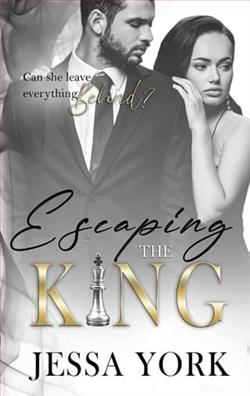Page 84 of Follow My Voice
Dr. B.’s question does not come as a surprise. I’m sitting on the comfortable couch in his office. Honestly, I’m so excited to tell my therapist about all of my recent progress: that I’ve made friends, that I overcame a panic attack on my own, that I met the guy who brightened my evenings with his voice, that I’m navigating college better than I expected. I want to tell him that he’s been right all along, that yes, I will make it through this. It may not be easy, but it is possible, just like the genuine smile that forms on my lips as I answer him. “I’m… I’m good.” For some reason, my voice breaks because it’s been so long since I’ve been able to utter these words. I feel tears welling up in my eyes.
Dr. B. smiles warmly. “I’m so glad to hear that, Klara.” He hands me a box of tissues. “Those tears of relief, of joy, feel good, don’t they?”
I nod silently.
“I imagine you have a lot to tell me. What do you say we celebrate with a hot chocolate?”
I nod again and he stands up to prepare it at a machine behindhis desk. The smell of hot chocolate fills the office, and a minute later, he hands me my cup and I take a sip before I begin telling him everything.
Dr. B. listens attentively, writing notes here and there. His face occasionally lights up, especially when I tell him about the panic attack I had at the soccer game.
“Bravo, Klara. Have you stopped to acknowledge your accomplishments and congratulate yourself, to say out loud how proud you are of yourself?”
“Not necessarily—at least not out loud.”
“It’s so easy to say the negative things we think about ourselves out loud, but not as easy to say something positive to ourselves or to congratulate ourselves on an achievement. Do you know why? Because after spending so much time in that place of sadness and fear, you get used to highlighting the negative, to expressing only the bad. Somehow, you forget that positivity has just as much right to be expressed. It’s important to smile at yourself in the mirror and congratulate yourself on what you’ve achieved.”
“I don’t think I could do that without crying. I’m so sensitive.”
“Well, then cry,” he says with a shrug. “Tears are another way of expressing our emotions, our deep feelings, which are sometimes difficult to translate into words. Your emotions are valid, your tears are valid, and so is your laughter, your smile. Everything you are as a person is valid and wonderful.”
“I still can’t believe I’m getting better, that this is possible. The world”—I think of Yana and her friends—“is scary sometimes, but being able to take part in that world is very exciting. It means that”—I think of Kang, my friends, even campus—“I’m not as terrified anymore, that I can leave the house more often, that I can be… normal.”
“You’ve always been normal, Klara. But you’ve had your battles, you’ve had to fight to regain your mental health.”
“It hasn’t been easy,” I admit, wiping away a rogue tear.
“No one said it was. You’re a warrior. I am so proud of you, Klara. Think of the girl who came into my office almost ten months ago, trembling, clutching her sister’s hand.”
As he says this, I picture myself walking in that afternoon, scared to death of being away from home.
“And now here you are telling me that you can go out alone, that you have friends, that you overcame a panic attack all by yourself… You realize how proud you should be of yourself, don’t you?”
“Yes.”
“I want you to go home after this session and congratulate yourself on everything you’ve accomplished, okay?”
“Okay.”
As soon as I get home, I go into my room and close the door. I look around lovingly, remembering when this was my safe place, the space I so rarely left. I remember pacing back and forth. I remember sitting on the floor in the corner, crying, hugging my mother’s picture. I remember lying in bed with my headphones on listening to Kang’s show, unable to look at myself in the mirror because it made me feel so awful about myself.
I walk now to the mirror and my reflection greets me like always, but it no longer makes me feel bad.
“I…” I begin, following Dr. B.’s advice, “I’ve done a good job.” My eyes redden. “I’ve overcome a lot—I’ve fallen, I’ve gotten up, it’s hurt, it’s burned, but I’m still here.” I feel the tears sliding down my cheeks. “I’m strong. I’m proud of myself.” I take off my wig and run my fingers through my short hair. “I’ve conquered so many of my fears, and now it’s time to work on my self-esteem. I won’t hide anymore; my scars, my suffering, are nothing to be ashamed of.” I put my hand on the mirror. “I’ve made it out into the world. Congratulations, Klara,” I say, voice breaking. “Mom, you must beso proud of me.” I look at a picture of the two of us and I flex my biceps. “I’m strong,” I say loudly. “I’m so strong, Mom.”
My mother’s smile in the photo fills me with peace and tranquility; I can almost see her there in my reflection, smiling and planting a kiss on the side of my head.“You’re my champion, baby.”I close my eyes, remembering her voice.
“If only I could see you again, Mom. Feel your warmth, smell your scent.”
I wrap my arms around myself, trying to remember the last hug my mother gave me, imagining it filling me up with energy, giving me strength. I don’t want my memory of her to bring only sadness; I want it to be something that gives me strength, that gives me the courage to go on, because my mother deserves to be more than a sad memory. She was an amazingly wonderful woman who gave me and my sister a great childhood. She deserves to be honored in a positive way.
“I will never forget you, Mom. You will always be here in my heart, with me through every struggle, every victory, every defeat, because you are a part of me, even if you’re no longer here.”
“Klara?” Kamila knocks on the door.
“Come in.”
She enters carrying a box in her hands. Andy is behind her with another, larger box.















